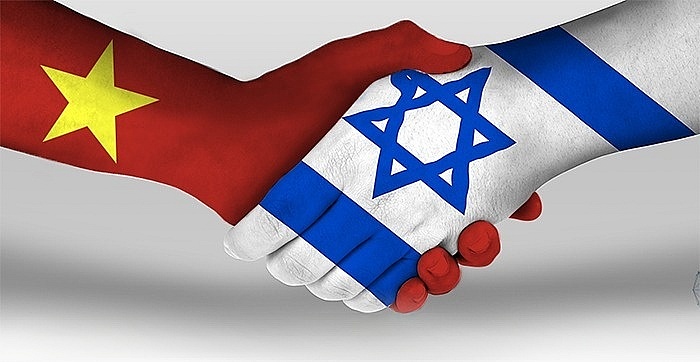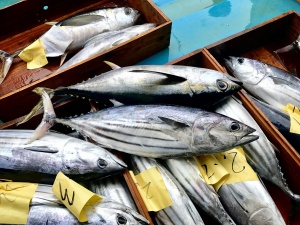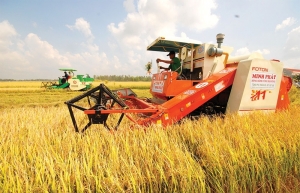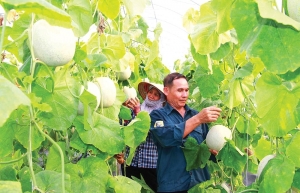Substantial Israel agreement nearing completion
A representative from the Ministry of Foreign Affairs’ Department of Middle East and African Affairs told VIR that Vietnam and Israel are working to remove trade and investment barriers for companies of both countries to expand their presence in their respective territories.
“To this end, the two nations will ink a bilateral free trade agreement at the end of July during the official visit to the Middle Eastern country by Vietnamese Deputy Prime Minister Tran Luu Quang,” the representative said.
 |
| Substantial Israel agreement nearing completion, source: itrade.gov.il |
The Vietnam-Israel Free Trade Agreement (VIFTA) aims to remove obstructions to most trade activities and to promote bilateral trade. Impediments can be in the form of tariffs, import quotas, other non-tariff barriers such as technical standards, and sanitary and phytosanitary standards, according to the Ministry of Industry and Trade (MoIT), which has completed all necessary procedures for the signing of the deal.
The two countries have exchanged their requirements and offerings on opening doors to their respective goods markets. They have also determined their respective expectations on the levels and roadmaps of tariff reductions, especially for the groups of goods that can bring about big benefits and are their own competitive advantages.
Vietnam exports about 70 items of all kinds to Israel on an annual basis. The key exports include electronics and mobile phones and their spare parts; agro-forestry-fishery products; garments and textiles; footwear; machinery; and wooden products. Meanwhile, Israel offers refined oil and gasoline, pharmaceutical products, machinery and equipment, medical equipment, computer soft and hardware, farm produce, and chemicals.
Figures from the MoIT indicated that two-way trade turnover rose from $1.2 billion in 2019 to $1.6 billion in 2020, $1.88 billion in 2021, and about $2.2 billion last year.
In the first six months of this year, Vietnam’s total exports to Israel reached $347 million, up 85 per cent on-year, and its imports to Israel hit $1.05 billion, up 42.6 per cent on-year. It is expected that the two-way trade value will climb to as much as $3 billion next year or in 2025.
According to law firm Dezan Shira & Associates, the VIFTA is projected to further expand trade and investment between the two countries. The firm sees great cooperation potential in some sectors to be induced by the VIFTA, including agriculture, footwear, and electronics, among others.
“Vietnamese companies are able to produce mobile phones, and their parts at a lower cost than many other countries, making them a competitive option for Israelis looking for affordable electronics,” the firm said. “There is a growing demand for mobile phones in Israel, and Vietnamese companies have been able to capture a share of this market by offering affordable, good-quality products.”
In 2022, Vietnam exported to Israel mobile phones and components to the value of $293.2 million. In the first half of this year, the figure reached about $180 million.
The deal will also help the economies increase trade in the footwear and fishery industries. Specifically, Vietnamese companies have made significant investments in developing high-quality footwear products that meet international standards. Vietnamese companies manufacture a wide range of footwear products, including athletic shoes, dress shoes, sandals, and more.
“This diverse selection of products makes it convenient for Israelis to find footwear that meets their specific needs and preferences,” Dezan Shira said.
When it comes to fishery, Israel has a relatively short coastline, and this means that it relies heavily on imported fish and seafood. Vietnam has a well-developed fishing industry and can supply Israel with a wide selection of fish and seafood products to meet its demand.
Currently, Vietnam and Israel are strongly cementing cooperation in the agricultural and foodstuff industries.
For example, Vietnam’s TH Group is boosting its cooperation with Israeli firms in its projects worth billions of US dollars to produce milk and other agricultural products in Vietnam.
Israel’s Afimilk is also providing consultancy, an automatic milking system, and cow management software for TH’s $1.2-billion high-tech concentrated dairy and fresh milk production project in the central province of Nghe An.
Meanwhile, Israel’s Amiad provides water treatment solutions for the project, and Israel’s Lachish and One1 also provides feed mixing software and equipment.
This project has also received a fund worth $100 million from Israel’s government in order to import machinery, equipment, technology, and cattle.
In another case, Cao Nguyen Xanh JSC, a member of Cacao Intercontinental Corp, is now working with Israel’s NaanDanJain Irrigation Ltd., a producer and provider of tailor-made irrigation solutions.
NaanDanJain provides Cao Nguyen Xanh with modern irrigation systems and the Vietnamese company can save costs and time for irrigating its hundreds of hectares of cocoa trees in the Central Highlands province of Dak Lak. NaanDanJain firm is also seeking more Vietnamese partners.
Also, Yiftach Broner, area manager of Israel’s A.R.I.L, said that at present the company earns about $200,000 per year from selling its products in Vietnam. Their products include air and check valves, hydraulic control valves, unmeasured flow reducers, and software system analyses for surge and air valve sizing and placement.
“Vietnam’s agricultural sector is rapidly changing, and we are considering plans on how to raise our sales there. Vietnam will be our key market in Southeast Asia,” Broner said.
 | Vietnam becomes largest tuna supplier to Israel Vietnam has become the largest tuna exporter to the Israeli market after demand from the market boosted in the first haft of the year. |
 | Israel and Vietnam heading to deal Vietnam and Israel are preparing to sign a bilateral free trade agreement to beef up trade and investment ties, with the Middle Eastern country eager to engage in high-tech agricultural projects in the Southeast Asian market. |
 | Israel and Vietnam on brink of substantial trade deal An upcoming free trade agreement between Israel and Vietnam is poised to unlock a new era of economic cooperation. Gal Saf, head of the Economic and Trade Mission under the Embassy of Israel in Vietnam, discussed with VIR’s Celine Luu the implications of the deal and how it could create a win-win scenario for businesses of the two countries. |
 | Israel pact opens up enticing activities across industries Vietnam and Israel will sign a bilateral free trade agreement this month, so the Middle Eastern country can more easily engage in food and agricultural projects in the Southeast Asian market. |
What the stars mean:
★ Poor ★ ★ Promising ★★★ Good ★★★★ Very good ★★★★★ Exceptional
Related Contents
Latest News
More News
- Russian President congratulates Vietnamese Party leader during phone talks (January 25, 2026 | 09:58)
- Worldwide congratulations underscore confidence in Vietnam’s 14th Party Congress (January 23, 2026 | 09:02)
- Political parties, organisations, int’l friends send congratulations to 14th National Party Congress (January 22, 2026 | 09:33)
- 14th National Party Congress: Japanese media highlight Vietnam’s growth targets (January 21, 2026 | 09:46)
- 14th National Party Congress: Driving force for Vietnam to continue renewal, innovation, breakthroughs (January 21, 2026 | 09:42)
- Vietnam remains spiritual support for progressive forces: Colombian party leader (January 21, 2026 | 08:00)
- Int'l media provides large coverage of 14th National Party Congress's first working day (January 20, 2026 | 09:09)
- Vietnamese firms win top honours at ASEAN Digital Awards (January 16, 2026 | 16:45)
- ASEAN Digital Ministers' Meeting opens in Hanoi (January 15, 2026 | 15:33)
- ASEAN economies move up the global chip value chain (December 09, 2025 | 13:32)

 Tag:
Tag:




















 Mobile Version
Mobile Version